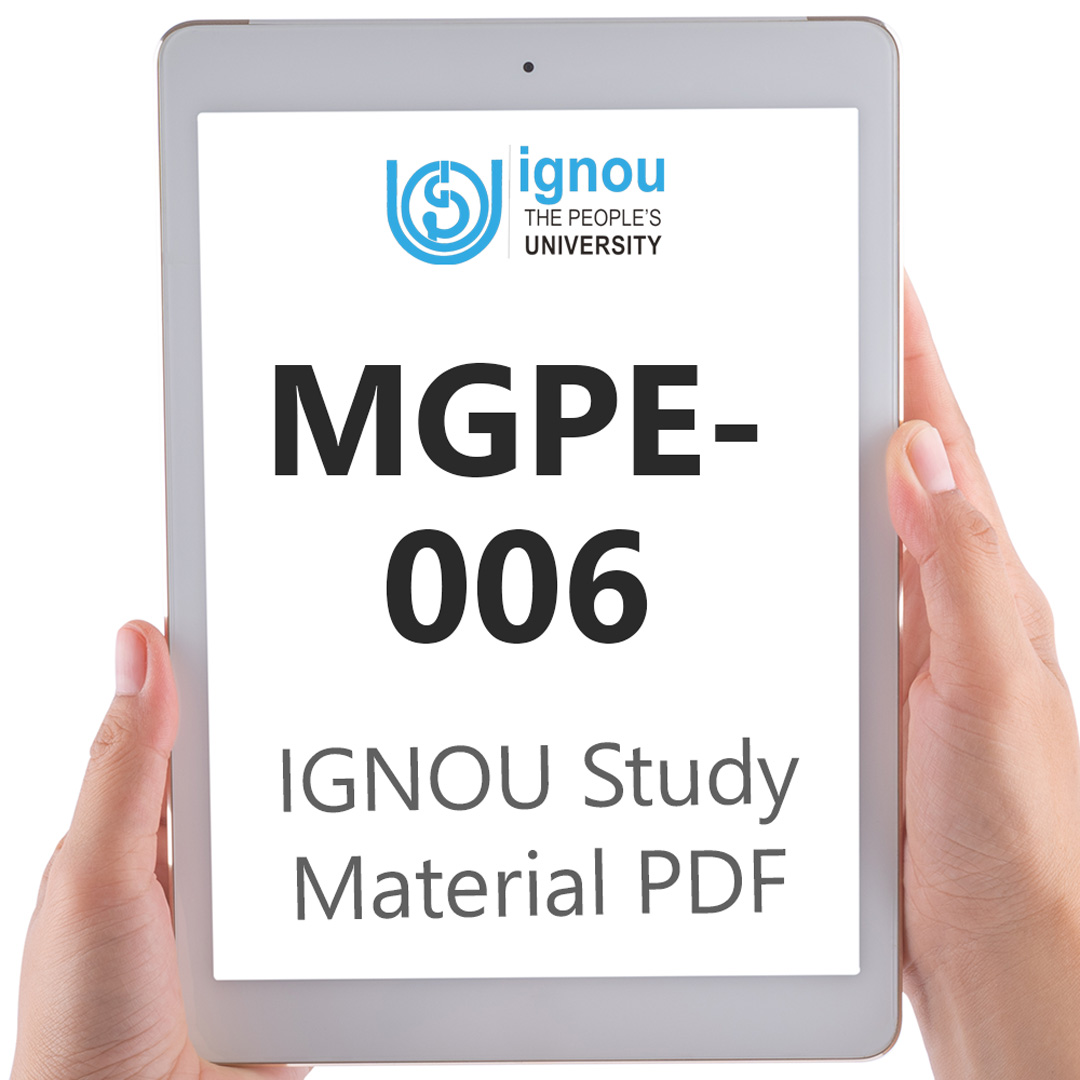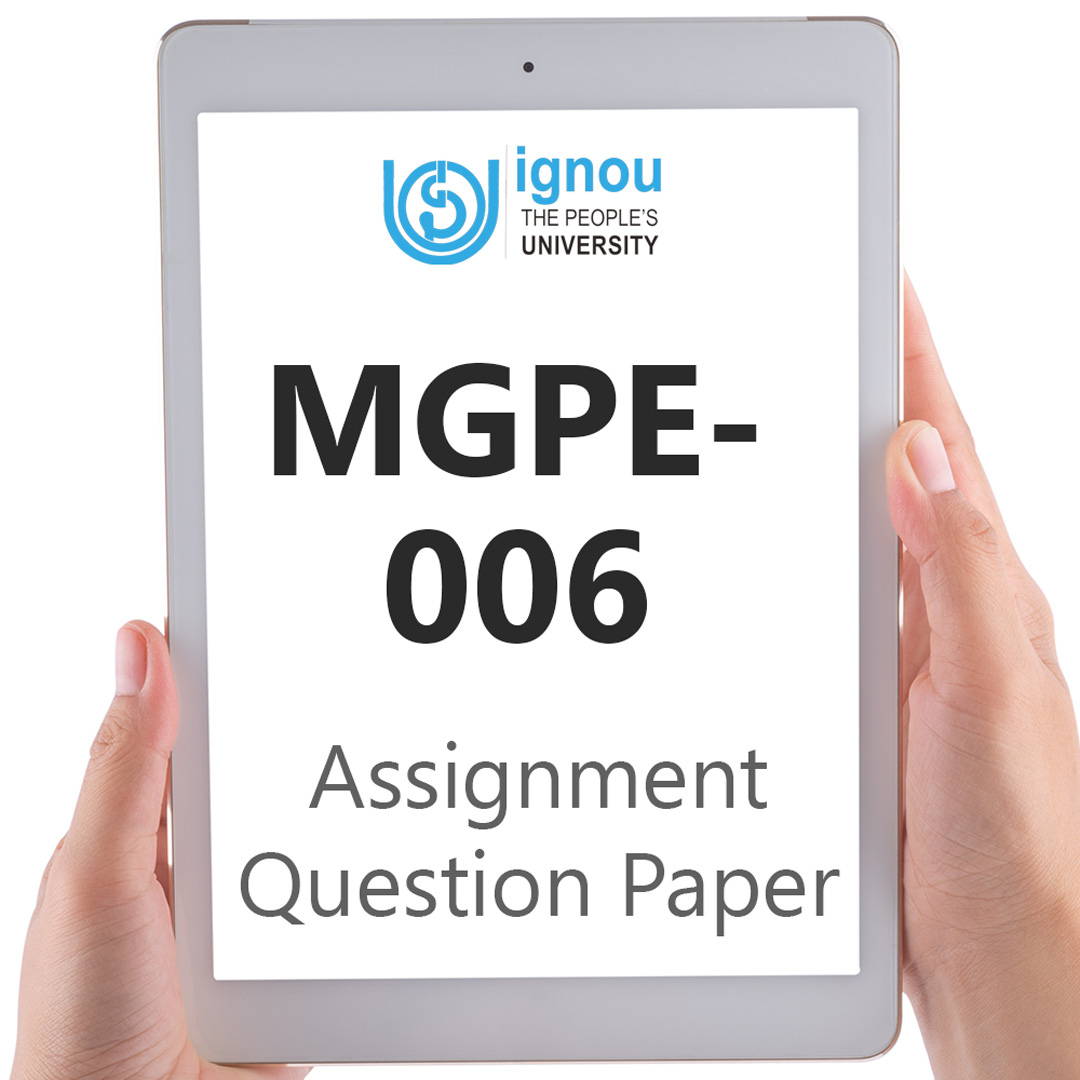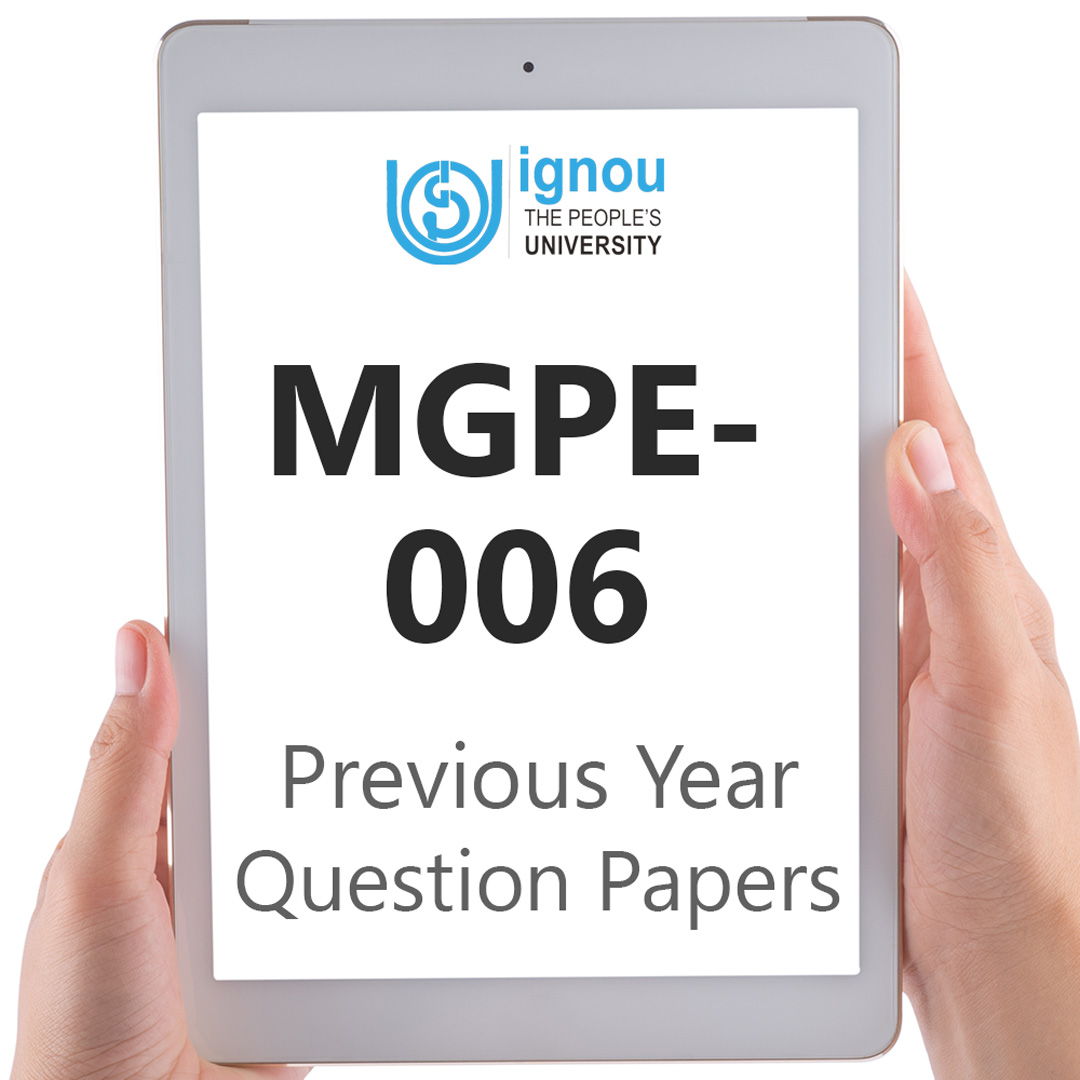If you are looking for MGPE-006 IGNOU Solved Assignment solution for the subject Gandhi’s Economic Thought, you have come to the right place. MGPE-006 solution on this page applies to 2022-23 session students studying in MGPS, PGDGPS courses of IGNOU.
MGPE-006 Solved Assignment Solution by Gyaniversity
Assignment Code: MGPE-006/ASST/TMA/2022-23
Course Code: MGPE-006
Assignment Name: Gandhi’s Economic Thought
Year: 2022-2023
Verification Status: Verified by Professor
Answer five questions in all, selecting at least two questions from each section. Each question is to be answered in about 500 words. Each question carries 20 marks.
Section-I
Q1) Critically examine modern development and Gandhian thought on it.
Ans) For dominance and control, two opposing viewpoints on what makes man compete. One of these viewpoints takes into account guy as he ought to be. It highlights the necessity for man to transcend his base nature and make the pursuit of a higher life goal—like self-realization—the guiding principle of his existence. His daily activities must be governed by this idea. The pursuit of one's basic necessities is in no way neglected or shunned when one is motivated by a higher life purpose. Because it is impossible to pursue a greater life goal without also taking care of basic needs. The other, crucial part of man's existence is the satisfaction of basic human needs.
The traditional perception of man as he should be. However, this viewpoint was rejected in favour of what Giambattista Vico called "man as he is" with the advent of the modern era in the seventeenth century. According to this theory, a person is just a mind-body combination made up of reason and passion. Therefore, it follows that the spiritual side of man's existence is repressed or even disregarded. The rejection of any ultimate goal or summum bonum in life, as Thomas Hobbes emphasises, required giving up the conventional worldview, notably the notion that man is more than a natural being.
With the rejection of a greater life purpose, man's pursuit of wealth, power, and reputation became his main focus. In order to satisfy his continuously expanding requirements, a vast industrial system was created. As a result, economic growth has taken the top spot on the scale of values, guaranteeing not just the accomplishment of man's self-described goals and, consequently, his physical and moral well-being. As a result, what in the traditional perspective of man was merely infrastructure became crucial in the modern era.
This permitted demands to become boundless and acquire auto-legitimacy while enabling kama and artha to escape the suzerainty of dharma. As John Cooper observes, man's life becomes "open-ended," implying that he must maximise the quantity of certain commodities in his life as a whole without stating exactly what this maximum should be.
The traditional perspective of man differs from the modern one in this area because it places restrictions on the never-ending wishes and emphasises the idea of want limitation as a prerequisite for establishing order in a person's interior.
It is asserted that satisfying one's endlessly recurring wishes not only leads to happiness for a person but also fosters two other factors that have a tremendously valuable impact on their character development. First of all, the latent and dormant potentialities of man can only be awakened through the fulfilment of wants. Kant believed that the desire for glory, dominance, or money was natural. Man is inspired to compete for position among his fellow humans, whom he cannot bear to bother or even leave alone. Discord is a necessary result of this since it awakens all of his dormant abilities in him and marks the beginning of the transition from the crudeness of barbarianism to the culture of civilisation.
Q2) Why did Gandhi think that the British had colonized the mindset of the Indian elite?
Ans) When Gandhi travelled to Champaran, he first became aware of the economic effects of colonialism in India. The British first found indigo, also known as Neel in most Indian languages, for use in the textile business. The East India Company began trading in indigo around 1600, before it had any political influence in India as a coloniser, and it was a significant product that brought them enormous wealth. When the British took over Bengal province at the end of the eighteenth century, the first uprising against the Company and then the British Raj took place there before spreading to sections of Bihar. From the start, the system was exploitational. In approximately a century, Champaran had surpassed all other regions in Bihar in terms of indigo farming.
The British planters forced the farmers to cultivate indigo during the colonial era, as well as accepting lower prices and paying high land taxes. It is clear that the system encouraged serious extortion. Gandhi returned to India from South Africa in 1915, the same year that the Settlement Commissioner's Report was published. One of the brave indigo growers, Rajendra Shukla, consistently voiced his opinions in numerous political forums. Gandhi was approached by him at the Lucknow Congress, and he was urged to champion this cause. Gandhi reluctantly agreed to it but later became its champion. During the Champaran Satyagraha, Gandhi ran across colonialism once more. It was in India this time.
Gandhi also came into contact with an additional form of Indian colonialism. This had to do with mindset. Gandhi claimed that the Indian populace had become accustomed to being colonised. This is how he put it in Hind Swaraj. He was able to plainly perceive that the Indians who were struggling for freedom and home rule lacked an indigenous vision of the nation and the tenets upon which society should be built or rebuilt. During his travels to India in 1896 and 1909 and his meetings with Indian nationalists in England, Gandhi learned this. He has described the thoughts of both the moderates and the extremists in Hind Swaraj, demonstrating how everyone wanted the British to leave but still desired to imitate the same system.
Gandhi saw that even educated Indians were adopting Western ideas and wanting to modernise India. To them, political freedom meant achieving home rule, or "Hind Swaraj." The ruler needed to be changed. They did not really object to the set of regulations governing government. The Indians' quest for freedom was similarly meant to be leading them to a similar civilisation. Gandhi considered this to be a colonial mentality. He understood that the British had also colonised peoples' thoughts. Gandhi rose to power to combat both socioeconomic and political colonialism in India.
Q3) Analyse the doctrine of Bread Labour. How does it solve the problems of inequality and exploitation in society?
Ans) Gandhi had a high regard and admiration for all forms of labour, whether they were cerebral, intellectual, or physical. He pointed out that each nation's labour is its true source of prosperity. David Ricardo's labour theory of value and its Marxian interpretation were not accepted by him. He passionately believed in the moral principle of the dignity of labour and that labour had a special position in society. His opinions on bread labour were greatly inspired by the writings of Ruskin and Tolstoy.
He also had a strong conviction that everyone should accept the value of doing their share of the household chores in order to create a society free from caste and class distinctions. Bread labour was crucial for individuals who lived a life of truth and non-violence, as these ideals forbid any possibility of exploitation, idleness, or the ownership of property for personal gain. Gandhi believes that if every individual worked to the best of his ability, doing beneficial or useful job would be a sure-fire way to fix the nation's economic problems.
Gandhi once said that intellectual work is good for the soul and provides its own fulfilment. The social structure will undergo a quiet revolution if the law of bread labour is followed. The key to human victory will be replacing the struggle for survival with the struggle for mutual benefit. The law of man will take the place of the law of the animal. Even if intellectual work is vastly preferable to physical labour, it will never be able to replace it, just as intellectual food is far superior to the grains we consume.
When the wealthy engage in some beneficial physical labour, they will learn about the challenges faced by millions of workers. He therefore desired that everyone perform some useful physical work. Bread labour cannot also be defined as physical labour performed under duress or ignorance. Obeying the law of labour for bread results in poverty, disease, and unhappiness. Slavery exists there. It must offer contentment and health if we willingly obey it.
Gandhi believed that everyone must freely engage in some beneficial physical labour in order to end the battle between labour and capital. He believed that if everyone engaged in physical labour of a productive type, industries related to some basic requirements, such as agriculture, spinning, weaving, carpentry, etc., would grow.
The problem of educated unemployed people will be resolved by the love for Bread labour, which will also give work to the unemployed manual labourers. Not only will the number of wants decrease, but productivity will rise when everyone is working in productive physical labour. The lack of these two items will be lessened, and the overcrowding, sickness, and unhappiness issues will be resolved. Bread-making was also necessary for individuals who lived a life of truth and non-violence, as these ideals forbid any chance of exploitation, idleness, or the ownership of property for one's own gain. Gandhi believes that if every individual worked to the best of his ability, doing beneficial or useful job would be a sure-fire way to fix the nation's economic problems.
Section-II
Write a short note on each part of the question in about 250 words:
Q1) (a) Gandhi’s Views on Industrialisation
Ans) Gandhi’s Views on Industrialisation includes the following:
Gandhian Model of Industrialisation
Gandhi's plan of industrialization consisted of small-scale, locally sourced, quickly gestating, and easily marketable village industries. He favoured the model of the khadi and local industries. Gandhi's approach to small-industry-focused industrialization was founded on the idea that an independent small producer should produce for his needs rather than for the purpose of material gain. These little producers belong to a socioeconomic type that is fundamentally distinct from both the modern proletariat and the mediaeval surfs.
Now, these modest self-employed producers are not also the individual-based capitalists; they labour and live within the limitations of village life. Gandhi was aware of the challenges and risks associated with cutting off millions of tiny producers from the tools of their trade. He thus contended that the involvement of his enormous force in economic development necessitates a fresh perspective and exploration outside of Western or Soviet paradigms.
Rural Industrialisation
Through the growth of the non-farm sector, it encourages the diversification of the rural economy. It has a lot of work opportunities. There is no way to generate employment through the factory industries due to the lack of capital resources. Take the cottage or household industries, for instance. They demand a tiny amount of money. An artisan family could start with an investment of about 600 or 700 rupees, and the job opportunities would be ten, fifteen, or even twenty times more than in similar industrial businesses.
Gandhi's strategy to development placed a high priority on full employment. A nation's wealth, its human resources, shouldn't be wasted. Thus, eliminating widespread poverty and unemployment served as the primary inspiration for the Gandhian industrialization concept.
Q1) (b) Ruskin and Tolstoy on Bread Labour
Ans) John Ruskin made note of the value of physical labour and the importance of it in "The Seven Lamps of Architecture," where he expresses great care for the satisfaction of the carver while he works. He added that manual labour exalted the soul whereas mechanical labour degraded it. The first requirement of an honest and straightforward life is to work with a will and with full delight. Ruskin extols the virtues of the life of a labourer and believes that he is in no way beneath the soldier or the writer. The labourer serves his country with a shovel just as a man in the middle of life does with a sword or a pen; as a result, he is likewise deserving of honourable rewards.
Tolstoy foresaw impending danger if humanity disregarded the importance of labour for bread. Every healthy person is supposed to work hard enough to earn their food, and they are also supposed to use their knowledge for the benefit of humanity rather than to make a living or accumulate things they enjoy. All men would be treated equally, no one would go hungry, and the world would be spared from countless sins if this idea were followed universally. It's probable that not everyone will ever adhere to the globe rule. Millions of people notice it despite themselves and do not comprehend it. They comprehend the rule, but their mind is working against them, therefore they need an incentive to put it into practise. By giving it a ready obedience, individuals gain perfect calm and good health, as well as increase their ability for service.
Q2) (a) Influence of Gokhale on Gandhi
Ans) Gandhi had Gopal Krishna Gokhale as his political adviser. He was recognised as the political Guru by Gandhi. Both of them had very different political and economic views. Gokhale had little regard for Hind Swaraj. Yet they had a close, loving relationship. This relationship has been well described by Thomas Weber, who also demonstrates how Gokhale affected Gandhi and how Gandhi was influenced.
In Hind Swaraj, Gandhi defended Gokhale. The ideas of Gokhale were rejected by the youthful revolutionaries. He was considered to be friendly with the English. However, Gokhale was seen by Gandhi as having a sincere desire to serve the country and a pure heart. Gandhi was a pure spirit in Gokhale's eyes, and he publicly stated as much. Gandhi seems to have imagined a pure individual like Gokhale, and he must have believed that such a pure individual's politics would be similarly pure and serve exclusively the true interests of the people.
In addition to their shared political views, Gokhale deserves praise for his role in enlightening Gandhi about the difficulties faced by ordinary Indians. Gandhi thought about joining the liberation movement after returning to India in 1915, and Gokhale recommended him to travel the entire nation and study the socioeconomic situation of the populace. As is well known, Gandhi used this trip to assist him subsequently develop his ideas about the economy and how to create opportunities for the poor and jobless.
Q2) (b) Sustainable Development
Ans) The Brundtland Commission of the UN asserts that "Humanity has the capacity to make the development sustainable - to ensure that it will meet the requirements of the present without jeopardising the capacity of the future generations to meet their own needs." This definition places an emphasis on the resources' renewal or regeneration and best utilisation for the benefit of individuals, society, and the global community.
The economic, social, and environmental models—which serve as the three pillars of sustainable development—were added to this definition during the Johannesburg World Summit on Sustainable Development in 2002. At local, national, regional, and international levels, the Johannesburg Declaration established "a collective responsibility to advance and strengthen the interdependent and mutually reinforcing pillars of sustainable development—economic development, social development, and environmental protection." This perspective has drawn criticism for placing a greater emphasis on economic development and for using a definition that "obscured (their) concerns for human development, equity, and social justice."
The UN's Millennium Development Goals Declaration has eight short-term objectives that address peace, development, the environment, human rights, and attention to the weak, hungry, and impoverished. Some of these objectives were more explicit, such as halving poverty and attaining universal primary education by 2015. By 2050, the medium-term objectives and a wider range of human needs would have been met. Long-term improvements for all of humanity would include a "rich quality of life, strong human bonds, and a resonant connection to the natural world."





